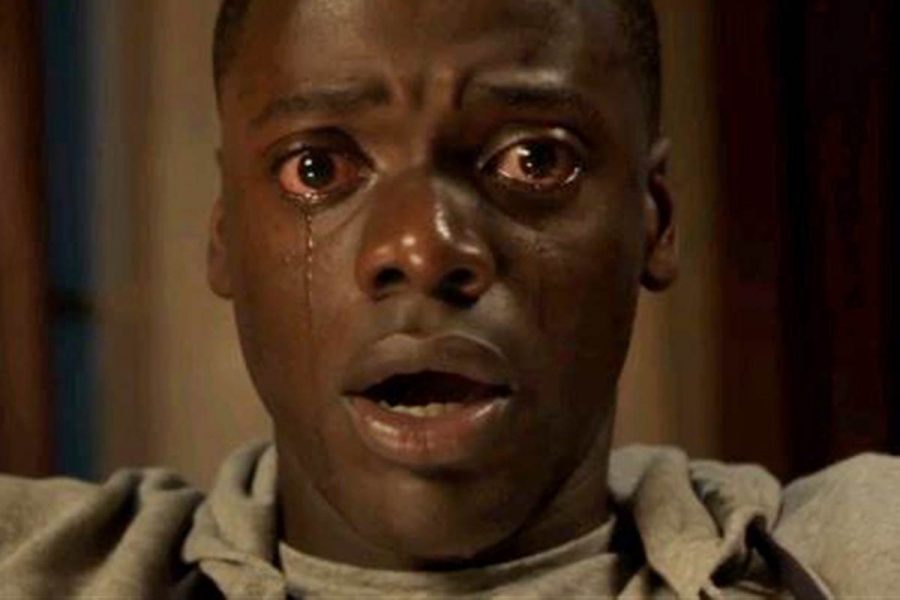Spectra Film Review: GET OUT
On paper, the whole premise of “Guess Who is Coming To Dinner” transformed into a horror movie doesn’t make sense logistically. And then you have sketch-comedy wiz-kid Jordan Peele making his first directorial effort, and you have to wonder how?
How did Peele manage to keep his directing chops locked up for so long. Aside from the occasional episodes of his own show on Comedy Central, he frequently was in front of the camera more so than behind it. “Get Out” is a cerebrally stunning rendition of a correctly timed script, being produced at the pinnacle of our nation’s biggest changes.
Now, I doubt that Peele intended for his movie to make that kind of statement, and it’s hard to deny some of the more racial undertones, but on almost every instinctive level of menace – the movie works.
Blending race-savvy satire with horror to exceptional results. “Get Out” is a social critique that proves fearless. In fact, the movie presents a terrifying notion of a new way white people have found to bring back slavery, which is all but plenty to frighten and enrage audiences across the country.
“Get Out” represents a searing political statement wrapped in the confines of a sub-genre that mine as well be called “escape the crazy people at all cost.” Usually, it’s the sympathetic characters that are held captive by a deranged cult . In this case, the crazy people are the liberal white elites, who overestimate themselves, which means Peele goes for the easy targets right away.
In theory, horror might have seemed liked a lost cause for Peele (who is one half of the “Key and Peele” sketch-comedy duo) and yet, after watching the movie it’s that satirical take that feeds into the movies deeper pulses. In “Get Out” the protagonist, a dark-skinned black man named Chris (Daniel Kaluuya – terrific in his somber performance), is an on-the-rise big city photographer who has been dating a white girl, Rose (Allison Williams), for five months – a long enough sentence that he can’t wiggle his way out of meeting her parents,
Chris has many concerns with the color of his skin, and consistently thinks about what others will think of the two together. Rose always assures him though, that her parents will love him. And if given the option her folks would have voted to give Obama a third term. Her dad, Dean (Bradley Whitford – who will always be Eric from “Billy Madison) is a neurosurgeon that takes much pride in his work, and her mom Missy (Catherine Keener) is a psychiatrist that has been known to tamper with forced hypnotism from time to time.
Creepy would be an understatement in describing the first encounters that Chris has with the household, at first he notices a recluse groundskeeper that likes to have late night workout sessions; and a maid named Georgia that frolics around the house unplugging things that don’t belong to her. They both stare with these slimy grins on their faces and, much like Chris, are black. Even weirder situations arise when Chris is the subject of a yearly “Armitage” gathering that dates back circa 1940 – and comes into contact with a lone blackman named Logan only to have him attack him screaming “GET OUT!”
Peele is using his extensive knowledge of 20+ years of post-modern racism as a focal point for a movie like this. Mainly because, as a writer, Peele knows how to make us feel with Chris, the icy suspense that he is an outsider. The first half of the movie plays out as such, with tense, white knuckle suspense being cranked out at a steady rate. And Chris’ around the clock side-bar phone conversations with his best friend (LilRel Howery) often produce hilarious results, because it’s like a Shakespeare play with all the ironic foreshadowing.
Yet, for as delicately balanced and richly ambitious the overall movie is, you can’t help but think the movie settles in the end. With all the big questions that are put forth, you would hope the script wouldn’t be too predictable in the execution. Still, Peele is a natural born filmmaker with an eye for creating first class entertainment. He stated that he wanted to make a horror movie that he had never seen before, and the ideas he presents, while not always shock-till you drop horror, are actually fairly scary in real life. Which makes the violently choreographed third act seem earned rather than spliced together for effect. “Get Out” is built upon the foundation of bigger than life fundamentals, racial defiance, and a strong reflection of the WASP-ified elitists that are building this country. The fact that I must discuss those topics when describing a horror movie, speaks volumes to the character of the finished product. That really says something when the biggest scares the movie presents aren’t cheap thrills, but actual topics. B+


